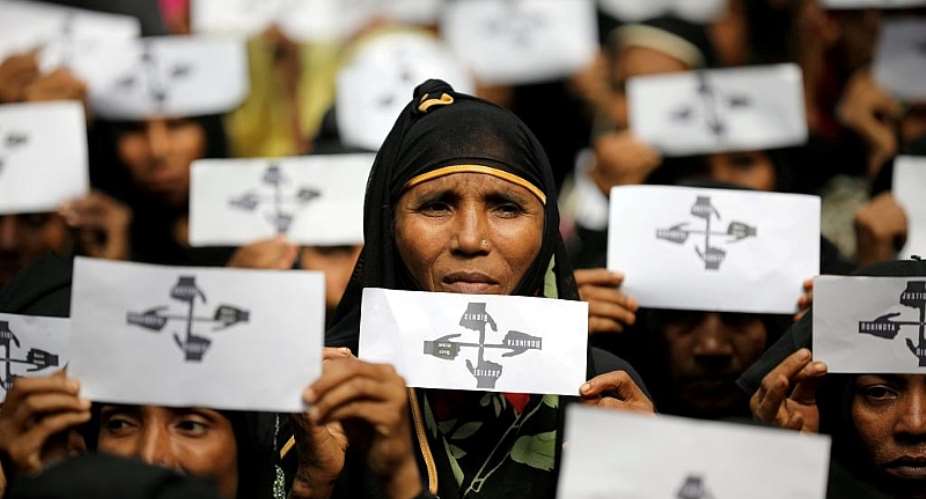Thousands of Rohingya refugees in Bangladesh were scheduled to be sent back to Myanmar today as part of a voluntary repatriation plan. But sources in Bangladesh say the launch has been postponed amid an outbreak of protests from Rohingya.
Some 2,000 Rohingyas were chosen to be sent back to Myanmar on Thursday from the border town of Cox's Bazaar in Bangladesh.
It was supposed to be voluntary repatriation. But it remains unclear how those on the list were selected and whether they consented to go.
The entire process has lacked transparency and heightened fears among a population already traumatised by the Myanmar military's atrocities, according to NGOs on the ground.
"Chaos and confusion"
“The situation in Cox's Bazaar now is one of chaos and confusion,” says Laura Haigh, Amnesty International's Myanmar Researcher. “We have a repatriation that is supposed to start today. We have a government in Bangladesh saying that these returns are going to be voluntary. We have Myanmar offiicials saying that they are going to welcome the Rohingyas back.
"And then we have the Rohingyas saying that they don't want to go because they will be returning to somewhere they will face ongoing crimes against humanity."
Haigh dubs Myanmar “an apartheid state" and warns the Rohingya would have no rights if they returned.
"They are going to have to live beside the same military who drove them out of their homes," she points out. "It is not safe. It is not going to be dignified. It is a repatriation that has to be suspended.”
Rohingya in hiding
Two days ago Amnesty International decided to retract a major humanitarian award given to Myanmar leader Aung San Suu Kyi.
Many of these Rohingyas chosen to be repatriated have disappeared. According to aid organisations, one Rohingya man tried to commit suicide after learning that his family is on the list, while others are now in hiding because they fear being forced to return.
Mixed signals from Myanmar
One major question is whether or not the Myanmar government actually wants them to return. According to Francis Wade, the author of Myanmar's Enemy Within: Buddhist Violence and the Making of a Muslim “Other", the Myanmar government has been giving mixed signals.
“It originally said that it would accept some back and then it said that only those who could prove to have legal status in Myanmar could return," he told RFI. "But none do. And even then it would only be to live in transit camps, which essentially look like internment camps. They can hold up to 30,000 returnees. So I think the government will accept a token number back to give a sense that it is welcoming. But it is certainly not going to take more than 700,000 back.”
There is also the issue of what the Rohingyas will return to. Wade believes they will be kept in isolation.
“The likely scenario is that those who do return will be placed in so-called 'model villages' and kept at a distance from Rakine," he explains. "Their freedom of movement would be severely limited. And this is already the reality for those in Northern Rakine state, Rohingyas live in effectively quarantined conditions. They have to receive special travel permits to move from one township to another. Their access to education, to healthcare, is very limited.”
The fate of the Rohingyas is very much in other people's hands. Their voice has been conspicuously absent from all these discussions.
“They must be consulted," says Haigh. “A lot of the refugees I have spoken to want to go home. But whether that home still exists is another matter. They want to go to a place that respects their rights, they want to have legal status, they want to be recognised as citizens, able to move around without having to apply for permission. They want what we all take for granted."





 Supreme court declares payment of wages to spouses of President, Vice President ...
Supreme court declares payment of wages to spouses of President, Vice President ...
 Publish full KPMG report on SML-GRA contract – Bright Simons to Akufo-Addo
Publish full KPMG report on SML-GRA contract – Bright Simons to Akufo-Addo
 Kumasi International Airport to begin full operations by end of June
Kumasi International Airport to begin full operations by end of June
 Election 2024: Our ‘real challenge’ is getting ‘un-bothered’ youth to vote – Abu...
Election 2024: Our ‘real challenge’ is getting ‘un-bothered’ youth to vote – Abu...
 [Full text] Findings and recommendations by KPMG on SML-GRA contract
[Full text] Findings and recommendations by KPMG on SML-GRA contract
 Renegotiate SML contract – Akufo-Addo to GRA, Finance Ministry
Renegotiate SML contract – Akufo-Addo to GRA, Finance Ministry
 J.B Danquah-Adu murder trial: Sexy Dondon to Subpoena Ken Agyapong, Ursula Owusu
J.B Danquah-Adu murder trial: Sexy Dondon to Subpoena Ken Agyapong, Ursula Owusu
 Galamsey: Five Burkinabes jailed 20 years each for mining
Galamsey: Five Burkinabes jailed 20 years each for mining
 'It's no crime' – Abu Sakara defends Alan's exit from NPP
'It's no crime' – Abu Sakara defends Alan's exit from NPP
 'We know all your houses, pay your bills now or we’ll disconnect you; we're all ...
'We know all your houses, pay your bills now or we’ll disconnect you; we're all ...
